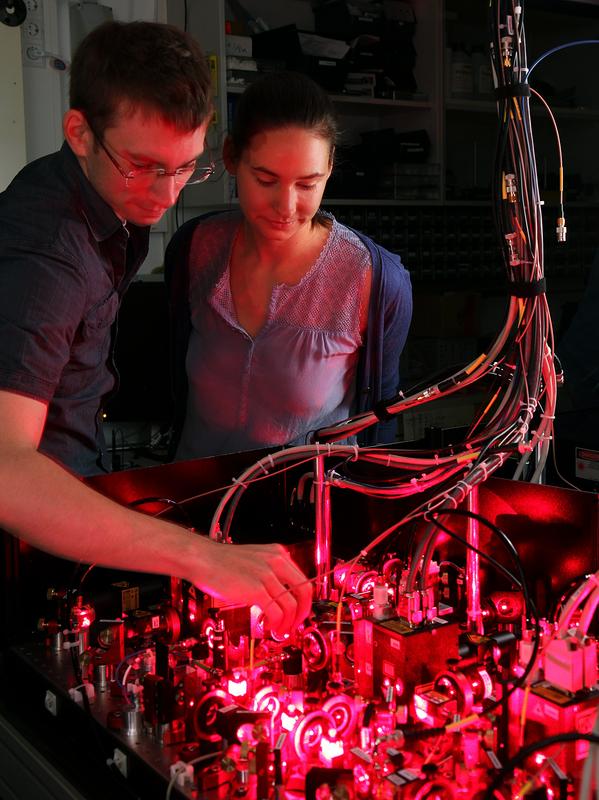
New Master’s programme: University of Kaiserslautern educates experts in quantum technology

The Master’s programme includes important techniques that are necessary for researching the quantum world.
Credit: University of Kaiserslautern
In August last year a Chinese team sent the first quantum satellite into space. Its purpose: to test a communications channel whose security from interception is guaranteed by the fundamental laws of nature. This is how rapidly quantum research is now showing that the strange possibilities of quantum mechanics can have enormously practical applications.
“The European Commission is investing a billion euros to apply quantum research,” notes Professor Dr Artur Widera, whose lab at the University of Kaiserslautern features quantum systems at near absolute zero. “This is not even just about radical new kinds of computers or secure communication networks. It’s also about new kinds of sensors for medical imaging, quantum simulators for materials research—a whole wave of technology rising up now.”
To develop these new technologies, there have to be experts who deeply understand the world of quantum particles, spins, and photons. The University of Kaiserslautern is addressing this need: it is introducing the four-semester Master’s programme in ‘Advanced Quantum Physics’ for the 2016/17 winter semester. This is one of the first study programmes in Germany to focus on quantum research and quantum technology.
“The study programme involves lots of practical work. Students can even work in the laboratory independently. Our teaching will include the important techniques that are necessary for researching the quantum world,” Widera continues. The programme will encompass topics such as photonics, solid-state physics, the processing of quantum information and the microphysical foundations of materials science. Theoretical quantum physics will also be covered. “Students will learn how to describe complex quantum systems and effects. This theoretical work forms an important part of all our research,” Widera adds.
During the Master’s programme, students will have the opportunity to become involved in the research projects of the individual working groups as part of a placement or as a research assistant. All lectures and seminars will take place in English. The Master’s thesis will be prepared in one of the working groups.
Quantum research represents a key field in its own right at the University of Kaiserslautern: researchers are closely examining quantum phenomena in four special research areas altogether. For instance, Professor Dr Michael Fleischhauer and his team are working on connecting quantum systems with their environment. These kinds of systems have so far been highly sensitive and unstable; they can only be maintained under certain conditions. Now, however, researchers are working on ways to use the environment to enhance quantum effects instead of suppressing them.
The European Union is also promoting research in this area. Professor Widera received an ERC Starting Grant – one of the highest awards granted by the EU – for his work on the quantum properties of superfluids. Using quantum models to simulate physics within the quantum world, Widera captures single atoms in a cage made from ultracold gas clouds and laser light, in order to discover mechanisms of superconductivity that have so far eluded comprehension. His colleague Professor Dr Burkhard Hillebrands has likewise been awarded an ERC Advanced Grant for his work with quantum spin excitations known as magnons, which in the future could enhance energy efficiency in data storage and processing.
These and many other Kaiserslautern researchers collaborate in the State Research Center for Optics and Material Sciences (OPTIMAS), which brings the fields of physics, chemistry, biology and material science together to investigate interactions between spin, light and matter. Education in advanced quantum physics at Kaiserslautern thus brings Master’s students directly into world-leading physics research with strong connections to other disciplines as well.
Those interested in applying to the Master’s programme should have completed a Bachelor’s programme that corresponds with the Bachelor’s course content in physics at the University of Kaiserslautern.
Prospective students abroad must apply by April 30th, whereas those in Germany have until August 31st.
Application for prospective students abroad:
University of Kaiserslautern
Department of International Affairs: ISGS
Gottlieb Daimler Str. 47
D 67663 Kaiserslautern
Germany
Further information is available here: https://www.physik.uni-kl.de/quantum-master
For questions, please contact:
Prof Dr Artur Widera
Subject area: the quantum physics of single atoms and ultracold quantum gases
Tel.: 0631 205-4130
Email: widera[at]physik.uni-kl.de












